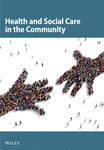Are primary care groups and trusts consulting local communities?
Abstract
Primary care groups and trusts (PCG/Ts) in the English NHS were established in 1999 and have responsibility for providing and commissioning health-care for around 100 000 people. PCG/Ts are dominated by health professionals, but are responsible for representing the interests of the local community. This paper assesses how they have informed and consulted local communities and the perceived impact of this consultation on decision-making.
The paper uses evidence from the National Tracker Survey of PCG/Ts, a longitudinal survey of 72 (15%) of the PCG/Ts in England, using data from telephone interviews with chairs and chief officers, and postal questionnaires to lay board members and representatives of Community Health Councils (CHCs).
Eighty-one per cent of PCG/Ts had public involvement working groups. Methods of consulting the community included consulting CHCs (87%), holding public meetings (75%) and consulting local patient groups (67%). Only 31% of chairs felt they were effective at consulting. Ninety-two per cent of CHC representatives attended all board meetings. Most CHC representatives reported that there had been little or no consultation with the CHC in areas such as commissioning, service development or clinical governance. Only 14% of CHC representatives rated PCG/T consultation with the public as effective. Eighty-seven per cent said that local communities were largely unaware of the existence of PCG/Ts, and 70% commented on the weaknesses in PCG/T efforts at public consultation.
Public participation is being taken seriously by PCG/Ts, but most are struggling to develop effective ways of involving local communities. Efforts to involve the public may become little more than token gestures. The proposed abolition of CHCs may make it more difficult for PCG/Ts to obtain a lay perspective. Effective consultation requires the development of new methods and adequate resources, but a stronger lay voice in the governance structures of PCG/Ts is needed.




